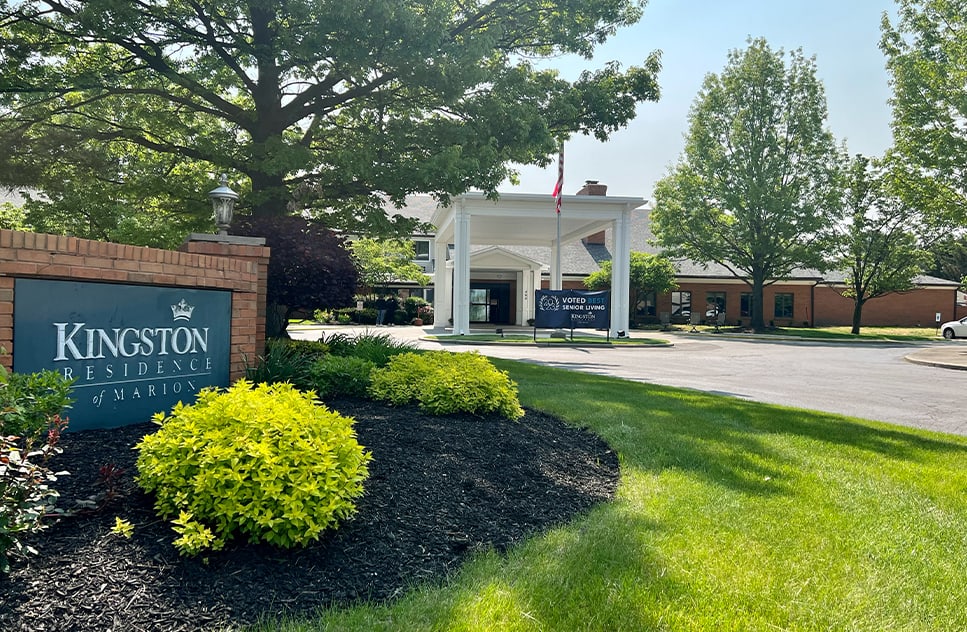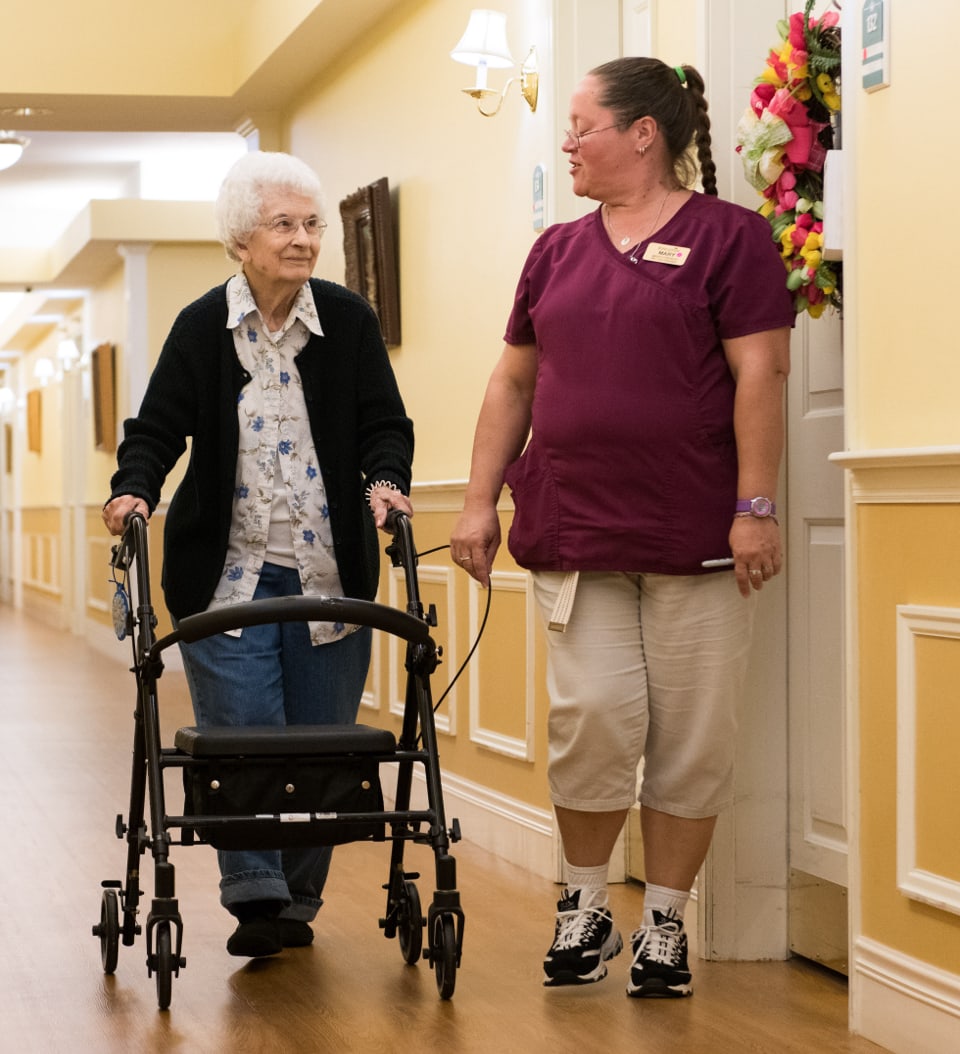Key Takeaways
- Normal memory loss doesn’t interfere with daily life and includes things like misplacing items or needing reminders.
- Dementia affects planning, communication, safety, and the ability to complete routine tasks.
- Repeating questions, confusion about time or place, and mood changes may signal something more serious.
- Not all memory problems are caused by dementia—other medical issues can play a role.
- Memory care may be the right fit when safety risks increase or caregiving becomes overwhelming.
Dementia vs. Age-Related Memory Loss
Watching a loved one become forgetful can stir up a mix of emotions. You may feel concerned, confused, or even a little afraid. These feelings are entirely normal, and that’s okay. You’re likely asking yourself: Is this normal aging or something more serious? Knowing the difference between age-related memory loss and dementia can help you take the next step with clarity and care.
Normal forgetfulness doesn’t interfere with independence. On the other hand, dementia causes daily disruptions in memory, judgment, and functioning. If your loved one forgets a name here and there but can stay independent, it’s likely just age. However, if their memory problems interfere with their quality of life, it’s time to take a closer look.
Understanding Normal Memory Changes as We Age
As people get older, it’s completely natural for memory and recall to slow down a bit. Your loved one might take longer to remember someone’s name or forget where they left their glasses, but they’re still managing their day-to-day life just fine.
Usually, age leads to:
- Occasionally forgetting names or appointments (but remembering them later)
- Needing reminders for new information
- Taking longer to recall words or facts
- Misplacing items from time to time
These changes might be frustrating, but they’re a normal part of aging. People living with these changes are usually aware of what they forgot and can still manage household tasks, finances, and social plans.
Key Differences Between Normal Forgetfulness and Dementia
When memory loss begins to interrupt daily life or causes noticeable changes in personality or safety, it could be something more serious.
Memory Loss That Disrupts Daily Life
When memory problems move beyond normal aging, they start affecting your loved one’s ability to handle everyday tasks. They might forget important information they learned recently or rely heavily on family members for things they used to manage independently. This type of memory loss interferes with work responsibilities, social commitments, and personal care routines.
Challenges with Planning and Problem-Solving
You might notice your loved one having trouble following familiar recipes they’ve used for years or struggling to manage things that were once routine. They may have difficulty concentrating on tasks that require multiple steps or following through with plans they’ve made. These changes affect your loved one’s ability to think through problems and organize their thoughts.
Difficulty Completing Familiar Tasks
Your loved one might struggle with activities they’ve done countless times, like driving to familiar locations, operating household appliances, or remembering rules for favorite games. These aren’t tasks they do occasionally—these are routine parts of their daily life.
Confusion with Time and Place
More serious memory concerns include your loved one losing track of dates, seasons, or how much time has passed. They might forget where they are or how they got there, even in places they know well. This confusion differs from normal aging because your loved one can’t figure out their situation, even with time to think about it or gentle reminders from family members.

When to Worry About Memory Lapses
Some memory issues are more than just signs of getting older. If you notice any of the following patterns, it may be time to talk with a healthcare provider:
- Asking the same questions repeatedly
- Getting lost in familiar places
- Trouble following instructions or steps
- Unusual changes in judgment or behavior
- Noticeable mood shifts
It’s also important to remember that dementia isn’t the only cause of memory loss. Things like medication side effects, vitamin deficiencies, depression, or even urinary tract infections can lead to similar symptoms. A full medical evaluation can help rule out other causes and diagnose exactly what’s causing your loved one’s cognitive changes.
When to Try Memory Care for a Loved One with Memory Loss
Memory loss can be tricky. It’s not just about forgetting something here and there, or about losing track of time. It can pose significant risks to a person’s safety—especially if it’s developing due to conditions like dementia.
If your loved one is showing clear signs of memory loss, memory care may be an ideal choice for your family. These communities offer a safe space where your loved one can thrive. In memory care, your loved one gains targeted cognitive support built to preserve their quality of life, even if memory problems or dementia are at play.
When Is It Time for Memory Care?
Choosing memory care isn’t about giving up. It’s about finding a setting that supports your loved one with kindness, structure, and safety. Many families try memory care when:
- They’re seeing consistent confusion or repeated questions
- Safety becomes a concern (wandering, forgetting medications)
- Social withdrawal is increasing
- Their loved one needs reminders for daily care or meals
- They’re feeling overwhelmed trying to manage needs at home
Memory care communities offer trained staff, personalized routines, and secure environments that promote both comfort and dignity. When memory loss, dementia, and cognitive decline are at play, this level of support can be incredible.
Let Our Team Help Your Loved One
At Kingston Residence of Marion, we understand how difficult it can be to face memory changes in someone you love. Whether your family is just beginning to explore support options or you’re ready for the next step, we’re here to walk alongside you. Memory loss can be tricky, but our experienced team knows how to help in a way that makes a true difference.
Here in our community, we can support your loved one every day, just like they deserve. With a range of cognitive support services, a comfortable environment, and an incredible team, we’re ready to welcome your loved one home. Schedule a visit with us today to learn more!






